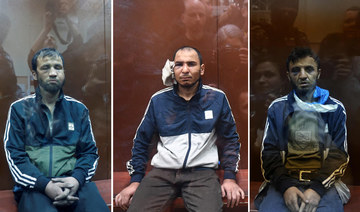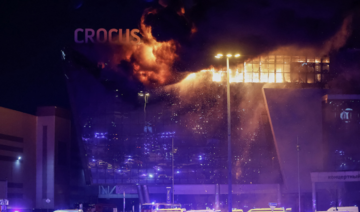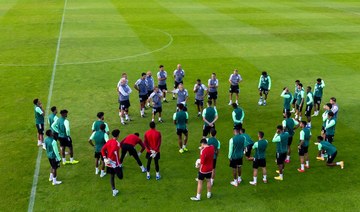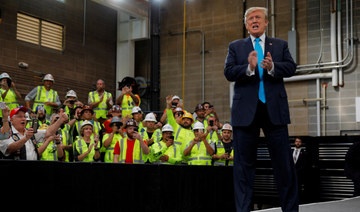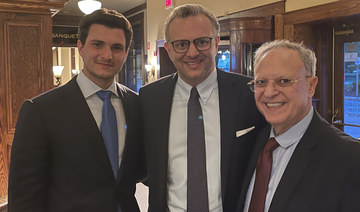BRASILIA: Venezuela’s foreign minister hit out this week against both Peru and Brazil, calling Peru’s president a “servile dog of US imperialism,” and slamming Brazilian politicians for all being allegedly corrupt.
On March 6, Delcy Rodriguez told a seminar in Caracas that Peru’s President Pedro Pablo Kuczynski “goes round, poor thing, with my respect because he is an elderly man, (like) a good dog who wags its tail at the empire and asks for an intervention in Venezuela. He’s alone, going round like a crazy man, with no one paying attention.”
Kuczynski, who is 78 years old, was elected president last year after spending years in New York as a Wall Street banker. He became a naturalized US citizen during his time there, and renounced his American citizenship before being elected president of Peru. He is also a vocal critic of Venezuela and the Chavismo policies practiced by the current government of President Nicolas Maduro, which are a continuation of the leftist policies started by the late-President Hugo Chavez.
Rodriguez was reacting to a speech that Kuczynski gave recently on an official visit to the US in which he said Latin America was in general like a well-behaved dog sitting on the carpet except for Venezuela, which “was a big problem.” He was the first Latin American leader to meet with US President Donald Trump in the White House on Feb. 24.
Rodriguez next hit out at Brazil on the same day, saying that the country had become a global shame ever since Michel Temer took over the presidency last year. “Today we must say, lamentably, that Brazil is a global shame. Ever since they undertook a coup d’état against Dilma Rousseff, every day their politicians are involved in scandals,” reported the Veja newsweekly. She also said that Brazilian politicians were corrupt, “but they do not care as the imperialist Right wing extends the red carpet for them.”
On March 7, the new Brazilian minister of foreign affairs, Aloysio Nunes, hit back at Rodriguez at his swearing-in ceremony, saying that she was not important. “She doesn’t have much importance. In this country of hers, the most important people are the jail guards, and not the minister of foreign affairs,” Nunes said.
Rodriguez responded on social media by saying that Nunes had started out on the wrong foot with Venezuela, and sarcastically noted that she would send him the ABC of Diplomacy. She also said that Nunes should mirror his predecessor who left because of corruption accusations against him. She was referring to Jose Serra, a close ally of Nunes and a member of the same political party, who recently resigned and returned to the Senate claiming he was doing so for health reasons. Serra’s name has been mentioned in the Car Wash corruption investigation as allegedly having accepted millions of reais in illegal campaign donations when he ran for the presidency of Brazil in 2010. Serra denies it.
Nunes, who until this week was a leading senator of the right-leaning PSDB political party, has long been a tough critic of Venezuela’s jailing of opposition politicians. Last year in June he led a delegation of Brazilian senators on a surprise visit to Caracas to try and visit jailed Venezuelan opposition leaders. The Maduro government strongly objected to their visit as interference in its internal affairs and ordered police and military troops to block their exit from the airport. In the end, the Brazilian senators returned defeated to Brazil without having been able to visit the prisoners.
Venezuela’s lashing out at its neighbors has not surprised observers. “Given that Venezuela’s government behaves diplomatically as if it had little to lose, it is likely that the Venezuelan foreign minister decided to play chicken with Brazil,” said Guilherme Casarões, professor of international relations at ESPM and FGV in São Paulo, in an interview with Arab News. “They probably expect Brazil’s newly-appointed foreign minister, Aloysio Nunes, to lose his temper and try to hit back at Venezuela, forcing the countries into a diplomatic crises that may well serve the Maduro regime.”
Venezuela, which has the world’s largest known reserves of oil and earns 90 percent of its income from oil exports, has been struggling with an economy that has suffered much since the international price of oil plunged a few years ago. The change of governments in Argentina, Peru and Brazil, which were until recently headed by left-wing populists, has also left Venezuela feeling more isolated in the region. But Casarões believes that Maduro’s government faces bigger challenges than just being isolated.
“Maduro’s greatest challenge is the dire economic situation in Venezuela, not diplomatic isolation,” said Casarões. “He surely benefitted from the incumbent left-wing governments in the neighborhood, for they fostered Venezuela’s integration into the Mercosur, but the rollback of leftist presidents only helps expose the country’s reality even further. Moreover, even before Rousseff’s impeachment, the Brazilian government was already adopting a firm position against human rights violations in Venezuela, not to mention that bilateral trade flows have been in steep decline since at least 2012.”
Negotiations between the opposition and the Maduro regime have come to a standstill after even the Vatican was unable to achieve to breakthrough. Being the largest and richest country of the continent means that Brazil should have been the natural choice to help iron out a political deal in Venezuela, but that is no longer the case since Temer became president. Maduro was a close ally of the leftist Worker’s Party of Rousseff, but now that she is out of power, there has been no love lost between the Brazilian and Venezuelan governments.
“Brazil cannot play the role of honest broker while President Temer remains in office,” explained Casarões. “It would demoralize Venezuela’s charges of a coup d’état in Brazil, and it would hurt the interests of many supporters of the current Brazilian administration, who have voiced a strong anti-Venezuelan sentiment on ideological grounds. This is unfortunate because Brazil –alone or through regional organizations such as Mercosur and Unasur –has played a crucial role as the center of gravity of South America for the last three decades. And I don’t think that extra-continental actors have enough interest or legitimacy to mediate a smooth transition, or a national pact, in Venezuela.”
Venezuela isolated in war of words with neighbors
Venezuela isolated in war of words with neighbors
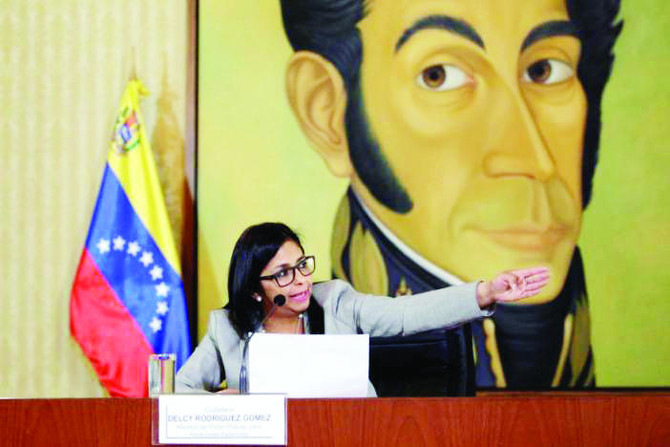
EU’s Borrell says recognizing Palestine is not a gift to Hamas
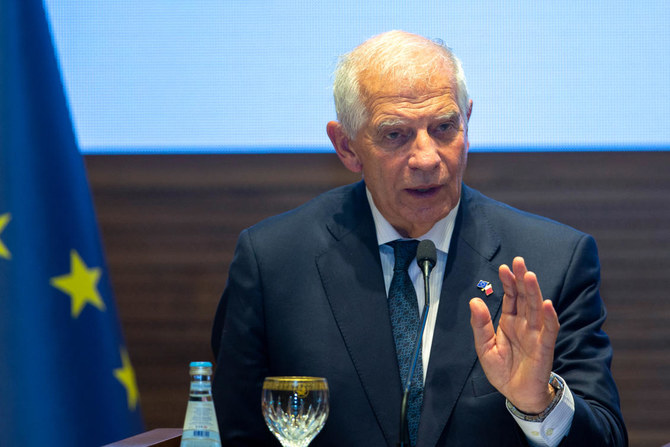
Ireland, Norway and Spain said on Wednesday they would recognize a Palestinian state on May 28, to help secure a halt to Israel’s Gaza offensive after the Hamas attack on Oct.7 and revive peace talks that stalled a decade ago.
“Recognizing the Palestinian state is not a gift to Hamas, quite the contrary,” he said. “The Palestinian authority is not Hamas, on the contrary they are deeply confronted.”
He added the EU already talked, financed and met the Palestinian authority.
“Every time someone makes the decision to support a Palestinian state, ... the reaction of Israel is to transform it in an antisemitic attack,” he added.
Philippines opens coast guard post after China build-up
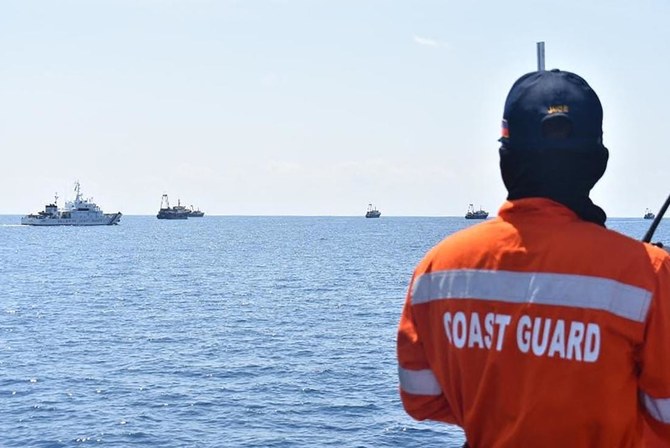
- China and the Philippines are enduring a bitter diplomatic dispute over rival claims to parts of the South China Sea
- Coastguard says the post will be used to gather data
MANILLA: The Philippines said Friday it had opened a coast guard post in the country’s far north to boost security following China’s “military build-up” near Taiwan over the past two years.
The outpost “shall gather essential maritime data and intelligence, enabling the (Philippine Coast Guard) to respond effectively to threats such as illicit trade, trafficking, piracy, and foreign intrusions,” National Security Adviser Eduardo Ano said in a statement.
“In 2022, the area around Itbayat witnessed a military build-up as China responded to political developments between Taiwan and the United States,” Ano said, announcing the opening of the station on the Philippines’ northernmost inhabited island.
“Securing peace, stability, and freedom of navigation along the Luzon Strait is crucial for ensuring Philippine national security and economic prosperity,” he added.
Itbayat is located around 150 kilometers (93 miles) south of Taiwan’s south coast.
China and the Philippines are enduring a bitter diplomatic dispute over rival claims to parts of the South China Sea.
China has built artificial islands and military installations in waters close to the Philippines.
China’s efforts to enforce its claims have in recent years including water cannon attacks by China Coast Guard vessels that damaged Philippine government boats and injured several crew members.
Itbayat is just outside the area designated by a vaguely defined map of dashes that China uses to claim most of the South China Sea.
Ano made no reference to war games that China began on Thursday in which it encircled Taiwan with warplanes and naval vessels.
Russia says Daesh behind deadly Moscow concert hall attack
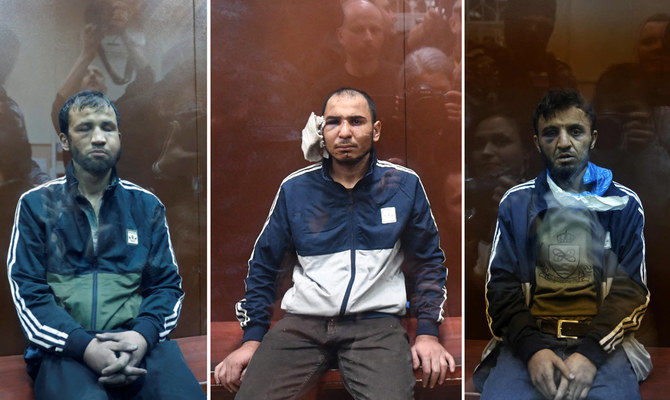
Moscow: Russia on Friday admitted for the first time that Daesh coordinated the deadly concert hall attack in Moscow in March.
“In the course of the investigation... it has been established that the preparations, the financing, the attack, and the retreat of the terrorists were coordinated via the Internet by members of Khorasan Province (IS-K),” a branch of Daesh active in Afghanistan and Pakistan, Alexander Bortnikov, the head of FSB, was quoted as saying by the RIA Novosti news agency.
At least sixty people have been killed after gunmen stormed a concert hall near Moscow in March, one of the deadliest attacks on Russia in decades.
Gunmen opened fire at a rock concert leaving dead and wounded before a major fire spread through the theater, Moscow’s mayor and Russian news agencies reported.
Putin has called the attack back in March as “a bloody, barbaric terrorist act” and said Russian authorities captured the four suspects as they were trying to escape to Ukraine through a “window” prepared for them on the Ukrainian side of the border.
Russian media broadcast videos that apparently showed the detention and interrogation of the suspects, including one who told the cameras he was approached by an unidentified assistant to an Islamic preacher via a messaging app and paid to take part in the raid.
Putin didn’t mention Daesh, known as Daesh in Arabic, in his speech to the nation, and Kyiv accused him and other Russian politicians of falsely linking Ukraine to the assault to stoke fervor for Russia’s fight in Ukraine, which recently entered its third year.
US intelligence officials said they had confirmed the Daesh affiliate’s claim. “ISIS bears sole responsibility for this attack. There was no Ukrainian involvement whatsoever,” National Security Council spokeswoman Adrienne Watson said in a statement. The US shared information with Russia in early March about a planned terrorist attack in Moscow, and issued a public warning to Americans in Russia, Watson said.
The raid was a major embarrassment for the Russian leader and happened just days after he cemented his grip on the country for another six years in a vote that followed the harshest crackdown on dissent since the Soviet times. Some commentators on Russian social media questioned how authorities, who have relentlessly suppressed any opposition activities and muzzled independent media, failed to prevent the attack despite the US warnings.
Daesh, which fought against Russia during its intervention in the Syrian civil war, has long targeted Russia. In a statement posted by the group’s Aamaq news agency, the Daesh Afghanistan affiliate said that it had attacked a large gathering of “Christians” in Krasnogorsk.
England’s soccer fortunes add sporting drama to UK election
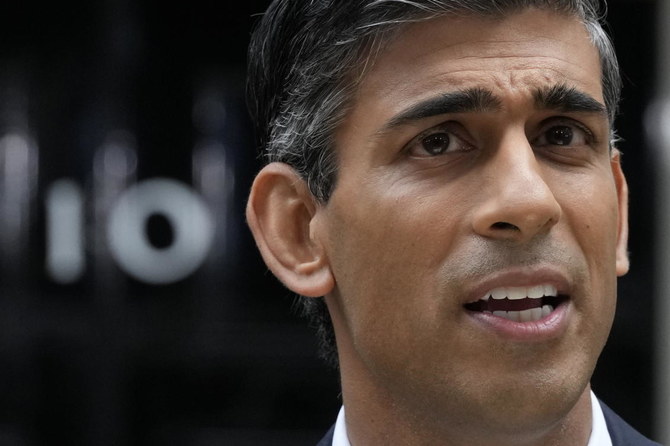
LONDON: Does British Prime Minister Rishi Sunak risk scoring an own goal by calling an election during the 2024 European Championship soccer tournament in July?
Sunak, himself a soccer fan, might be hoping for a boost to his struggling campaign if England do well, although whether there really is a link between sport and elections is disputed by experts.
Given the national team’s habit of morale-busting defeats in major tournaments, the chance of another hit to the English psyche appears just as likely a backdrop to the election.
On a positive note, however, England, runners-up three years ago, are among the favorites under manager Gareth Southgate with a team full of in-form attacking players including Harry Kane, Jude Bellingham, Phil Foden and Bukayo Saka.
Sunak unexpectedly called a national election for July 4 when the European Championship in Germany will be entering its most exciting phase.
Voters will head to the polls four or five days after England’s first knockout match, assuming the team avoid the embarrassment of elimination in the group stage.
There is also a chance England will have been pitted against their hosts and old rivals Germany in that last-16 game, a prospect that will fill many fans with dread.
Scotland are competing in the tournament too, potentially offering relief to the ruling Scottish National Party which, like Sunak’s Conservatives, is floundering in opinion polls.
Political pundits have offered non-sporting explanations for Sunak’s decision to call an early election, including a fall in Britain’s once double-digit inflation to close to 2 percent and signs that his flagship plan to send asylum-seekers to Rwanda might not get off the ground.
The timing has raised eyebrows, however, for the unusual overlap of an election campaign with the summer sporting calendar.
That has raised memories of one of the most painful of England’s defeats.
In June 1970, a 3-2 loss to West Germany in a World Cup quarter-final was followed four days later by a shock election defeat for incumbent Prime Minister Harold Wilson, triggering debate about the impact of the match.
Much has been written since about a possible link between sport and elections.
A 2010 paper by academics at Stanford and Loyola Marymount University in the United States said wins for local college American football teams earned political incumbents an extra 1.61 percentage points of support in subsequent Senate, gubernatorial and presidential elections.
Others have found no clear connection.
Stefan Mueller and Liam Kneafsey, at University College Dublin and Trinity College Dublin, mapped Irish election outcomes over decades with Gaelic football and hurling match results and found no correlation with support for incumbents or ruling party politicians.
Kneafsey said there were signs that some kind of influence on voters did occur.
“Whether they actually switch their votes, that’s probably a higher bar to clear and certainly the results there are inconclusive,” he said.
While that debate continues, it is clear that politics do weigh on the minds of soccer fans.
At a Euro 2016 match, three days after Britain’s shock Brexit referendum decision, many England fans joined in a crude chant directed at the European Union which ended with the words: “We all voted out.” England were beaten 2-1 by underdogs Iceland and were knocked out of the competition.
Another risk for Sunak is that sports fans resent his scheduling of the election at a time when not only Euro 2024 is taking place — from June 14-July 14 — but also the Wimbledon tennis championships which run from July 1-14.
Campaigning will also overlap with cricket’s T20 World Cup involving England and Scotland from June 2-29.
Some academics will be happy, however, as they will be able to do more research into the links between sport and voting patterns.
“We could actually do with politicians having more elections during this time to definitively test this,” Kneafsey said.
Trump, without evidence, claims migrants in US illegally ‘building army’ to attack Americans
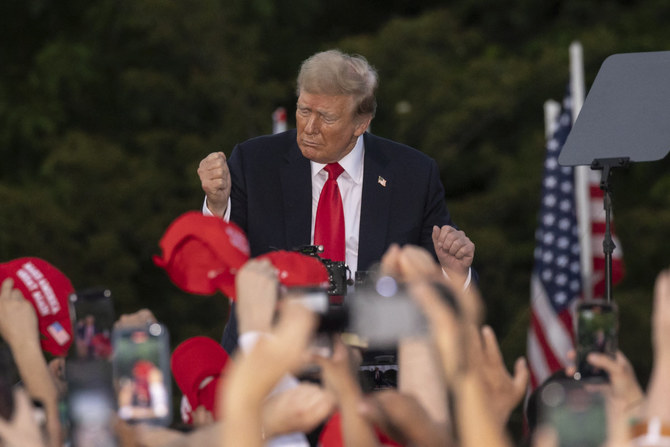
- He sought to portray migrants from China, the DR Congo and other countries as a violent threat, even as studies show immigrants are not more likely to engage in criminality
- Trump also sought to link the illegal entry of migrants from the Mexico border to the economic plight of Black and Hispanic voters, claiming that migrants were taking their jobs
NEW YORK: Republican presidential candidate Donald Trump claimed without evidence on Thursday that immigrants from Africa, the Middle East and elsewhere were “building an army” to attack Americans “from within,” once again using inflammatory rhetoric about migrants in the US illegally.
During a rally in the mainly Hispanic and Black neighborhood of New York City’s South Bronx, Trump sought to portray migrants from China, the Democratic Republic of the Congo and other countries as a violent threat, even as studies show immigrants are not more likely to engage in criminality.
“Almost everyone is a male and they look like fighting age. I think they’re building an army,” Trump said to a few thousand supporters who gathered to hear him in the South Bronx’s Crotona Park. “They want to get us from within.”
Throughout his campaign, Trump has repeatedly used incendiary language to accuse immigrants in the US illegally of fueling violent crime, calling them “animals” responsible for “poisoning the blood” of the country. As evidence, he points to individual instances of crimes, rather than aggregate data.
“We are not going to let these people come in and take our city away from us and take our country away,” Trump said, vowing to carry out “the largest criminal deportation operation in our country’s history” if re-elected to the White House.

Trump also sought to tie record levels of migrants caught crossing the US-Mexico border illegally with the economic plight of Black and Hispanic voters, arguing, without evidence, that migrants were taking their jobs.
Trump’s decision to speak in the Bronx was in part a matter of convenience. His campaign schedule has been crimped by his trial in New York on charges he falsified business records to hide a hush money payment to a porn star. In April, he made a campaign appearance at a convenience store in Harlem, New York.
Trump is locked in a tight race with Democratic President Joe Biden ahead of the Nov. 5 election. The Bronx rally was part of his effort to exploit Biden’s weakening support among Hispanic and Black voters.
Roughly 55 percent of Bronx County residents are Hispanic and about one-third are Black, and the crowd on Thursday was more racially mixed than his usual rallies, which are predominantly white.
Trump’s campaign had a permit for up to 3,500 people to attend the rally, the New York City Parks Department said.
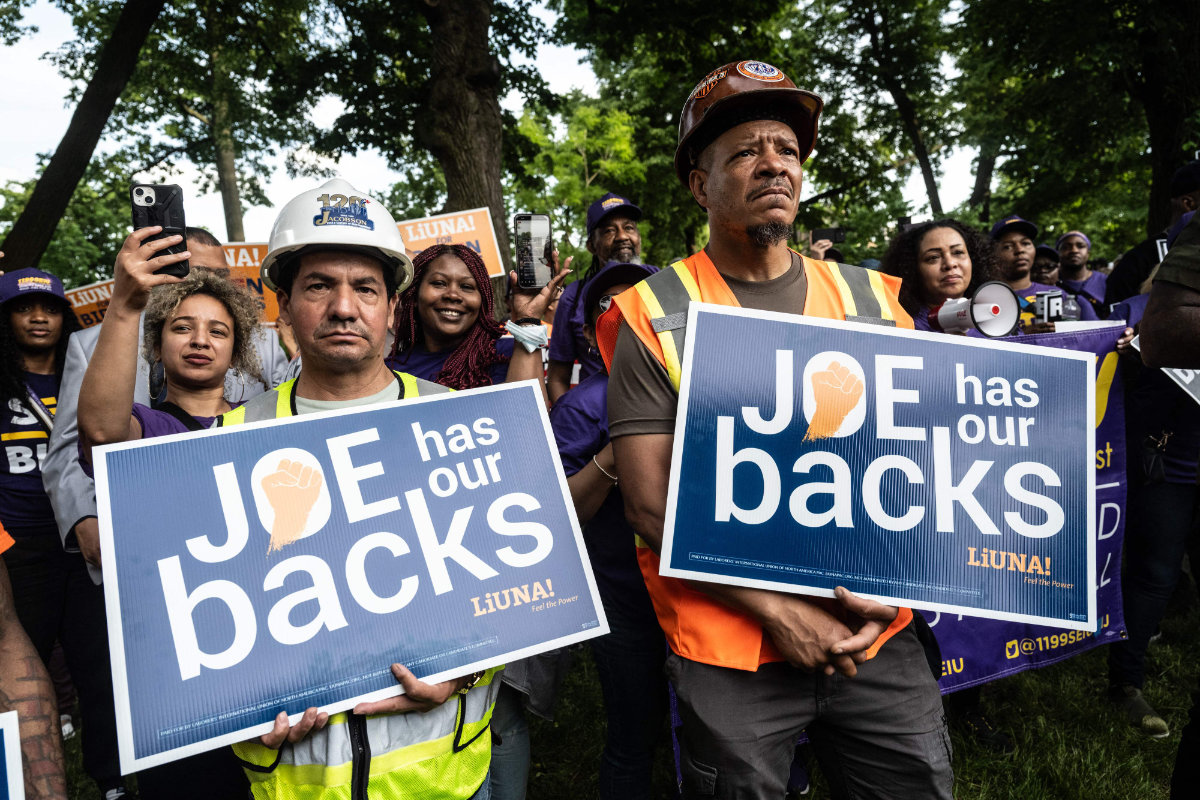
‘Historic’ rally in the Bronx
Recent polls suggest the Trump is gaining ground with Blacks and Hispanics, who were critical to Biden’s win in 2020. Trump strategists see a chance to grab enough of their votes to make the difference in swing states in November.
Biden has had a flurry of actions and events focused on bolstering support among African American voters. He has singled out Trump and other Republicans for attacking programs aimed at improving diversity, equity and inclusion, and on Thursday the president’s campaign released a pair of TV and radio ads criticizing Trump’s treatment of Black people.
Reuters interviewed nine Hispanic and Black rally attendees who said they will vote for Trump in 2024. Of the seven who were voting age in 2020, six voted for Trump. They cited the economy and immigration as their main reasons for supporting him.
“It’s historic that he’s here,” said Steven Suarez, 46, who is Puerto Rican, a reference to Trump being the first Republican presidential candidate to make a stop in the Bronx since Ronald Reagan in the 1980s. “He could have gone anywhere in New York City. He could have gone to Manhattan. He chose to come here.”
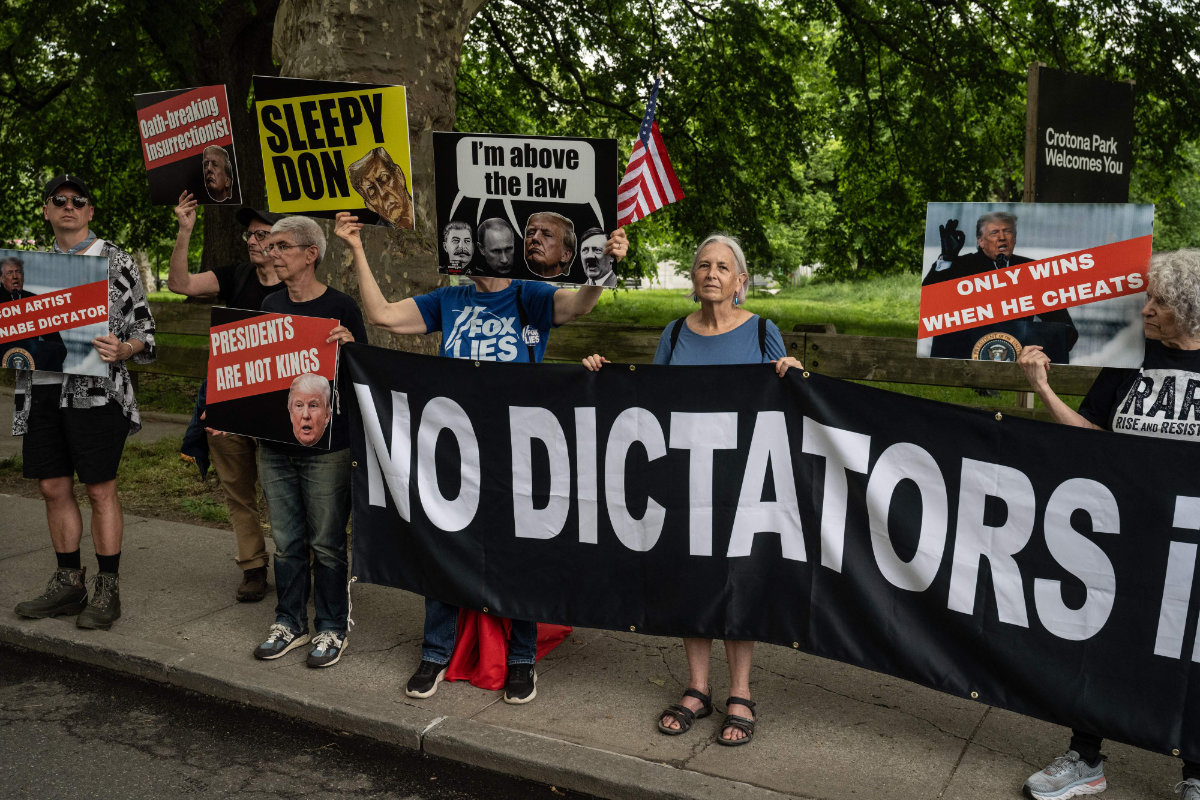
In a New York Times/Siena College poll in March, Trump was selected by 23 percent of Black and 46 percent of Hispanic respondents in a one-on-one matchup with Biden. That is far higher than the 12 percent of Black and 32 percent of Hispanic voters Trump won in 2020, according to Edison Research exit polls.
Political analysts have attributed weakening support for Biden among voters of color in part to the outsized impact of inflation on people living paycheck to paycheck.
Attending his first Trump rally on Thursday, Ed Rosa, 60, said he was a longtime Democratic voter but felt his vote for Biden in 2020 was a mistake. He said the Democratic Party had “become too socialist” and was not handling the economy or the southern border well.




